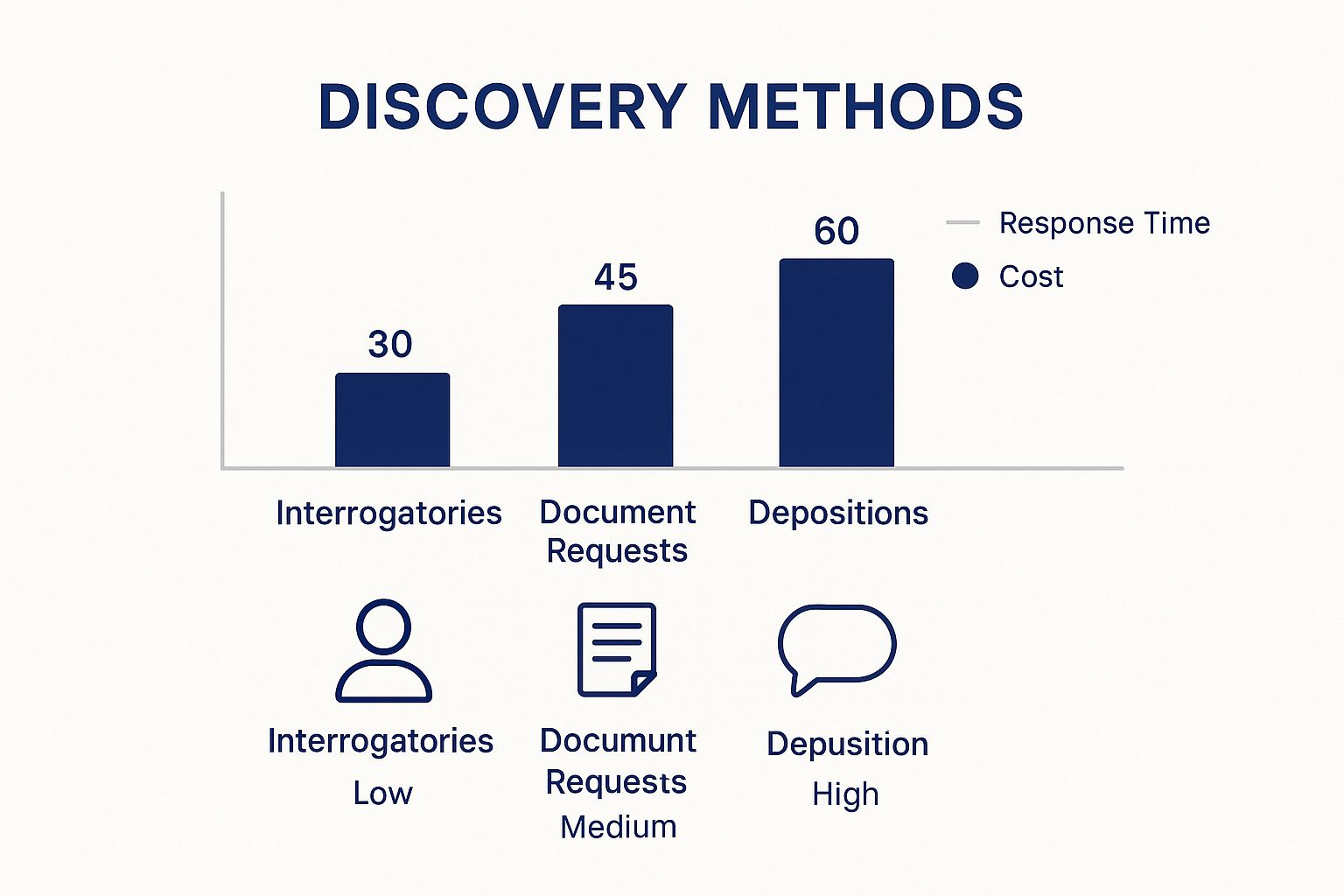What is Discovery Under NY Divorce Law
Hey everyone, “Discovery” as it’s known in family law is the key to avoiding an explosion when embarking on a matrimonial break-up. That’s right, if you don’t get this right it’s probably like dropping an emotional atom bomb on your already fragile relationship with your spouse. The Divorce can feel overwhelming. The division of assets and finances is often a significant source of stress. Understanding the discovery process is crucial for a fair outcome. This legal procedure allows both spouses to uncover the complete financial picture of the marriage.
This transparency safeguards your financial future and helps prevent hidden assets from impacting the settlement. It’s the foundation for a just division of property, child support, and alimony calculations.
Judges prioritize the discovery process. It ensures transparency and informs all subsequent negotiations. Without a clear understanding of the marital estate, negotiations risk being based on incomplete or inaccurate information, potentially leading to an unfair settlement.
Discovery in a divorce is a formal legal process. It allows each spouse to obtain information and evidence relevant to the case. This primarily concerns assets, debts, income, and other financial matters. The process ensures both parties have access to the same financial information. This enables informed decisions and fair settlement negotiations.
Why Is Thorough Discovery Important?
Thorough discovery is especially important in certain situations:
- High-net-worth individuals: Complex financial portfolios, including investments, businesses, and real estate, require detailed examination.
- Suspected hidden assets: Discovery tools can uncover concealed accounts, undisclosed income, and undervalued properties.
- Contested divorces: When spouses disagree on financial matters, discovery provides essential evidence to support claims and facilitate resolution.
Skipping or rushing discovery can have significant consequences. It can lead to an unequal division of assets, inadequate support payments, and long-term financial regret. It can also severely limit your legal options after the divorce is finalized.
How Discovery Impacts Your Divorce
Discovery affects every aspect of your divorce proceedings:
- Levels the playing field: Both parties gain equal access to all relevant financial information.
- Promotes informed decision-making: You can make strategic choices based on a comprehensive understanding of the financial situation.
- Strengthens your negotiating position: Evidence gathered during discovery provides leverage for fair settlements by supporting your claims.
- Reduces the likelihood of future disputes: A thorough discovery process minimizes the chance of post-divorce litigation related to undisclosed assets.
Understanding the power of discovery allows you to approach your divorce with confidence. You’ll know you’re taking the necessary steps to protect your financial future. This proactive approach empowers you to make informed decisions and strive for a fair and equitable resolution.
Five Powerful Tools That Uncover The Truth
The infographic above offers a quick glimpse at the time and cost associated with three common discovery tools: Interrogatories, Document Requests, and Depositions. While interrogatories are generally the quickest and least expensive, depositions, though taking longer and costing more, often yield the most comprehensive information. This underscores the importance of choosing the right tools for your unique situation.
Divorce discovery unveils the complete financial landscape of a marriage. This process aims to uncover all assets, debts, and income. Understanding what discovery entails is crucial for a fair settlement. These tools provide legal avenues to access information and evidence vital for property division, child support, and alimony decisions.
Interrogatories: Written Questions Under Oath
Interrogatories are written questions one party sends to the other, requiring sworn answers. These questions can encompass a wide array of topics, from financial accounts and assets to employment history and lifestyle expenses. Interrogatories are particularly useful for gathering background information and addressing discrepancies in financial disclosures.
Requests for Production of Documents: Unveiling Financial Records
This tool compels the other party to produce specific documents, such as bank statements, tax returns, and business records. Requests for production are crucial for verifying the accuracy of information provided in interrogatories and uncovering hidden assets or undisclosed income. Common discovery tools include interrogatories; requests for production of documents; and depositions, where sworn oral testimony is recorded.
To help visualize the key differences between these tools, let’s take a look at the following comparison:
Divorce Discovery Tools Comparison: This table compares the primary discovery tools used in divorce cases, including their purpose, typical timeline, and when each is most effective.
| Discovery Tool | Purpose | Timeline | Best Used When | Limitations |
|---|---|---|---|---|
| Interrogatories | Gather basic information and identify areas for further investigation | Relatively quick, typically a few weeks | Initial stages of discovery, seeking broad overview of finances | Limited to written responses, may not uncover complex financial schemes |
| Requests for Production of Documents | Obtain specific financial records and other relevant documents | Can take several weeks or months, depending on the volume of documents | Verifying information obtained through interrogatories, uncovering specific assets or debts | Relies on the other party’s cooperation in providing complete and accurate documents |
| Depositions | Gather sworn oral testimony from parties and witnesses | Can take several hours, scheduling can be complex | Clarifying inconsistencies, challenging credibility, obtaining in-depth information | Can be expensive and time-consuming, effectiveness depends on the skill of the attorney conducting the deposition |
This table illustrates how different discovery tools serve distinct purposes and have varying timelines. Choosing the right combination of tools is essential for a thorough and effective discovery process.
Depositions: Oral Testimony Under Oath
Depositions involve sworn oral testimony given by a party or witness, recorded by a court reporter. This allows for in-depth questioning and follow-up to clarify inconsistencies or gather more information. Depositions can be especially helpful in revealing hidden assets or uncovering contradictions in prior statements.
Requests for Admissions: Locking Down Undeniable Facts
Requests for admissions ask the other party to admit or deny specific facts related to the case. This streamlines the trial process by establishing undisputed facts, allowing the court to focus on contested issues. Admissions can be particularly useful in solidifying key aspects of your case.
Subpoenas: Compelling Third-Party Information
Subpoenas are legal orders compelling third parties, like banks or employers, to provide documents or testimony. This is invaluable for obtaining information not readily available from either spouse, such as records of hidden accounts or business interests. Private investigators can be helpful in divorce cases, especially in uncovering the truth about infidelity. Strategic use of these discovery methods can significantly strengthen your case and help ensure a fair outcome in your divorce.
What Discovery Really Costs (Time and Money)
Understanding the financial and time commitments involved in the discovery process is vital for navigating your divorce. This section delves into the realities of these costs, drawing upon insights from both divorce attorneys and clients who have experienced this complex procedure. Preparing for the road ahead empowers you to plan your legal strategy effectively.
Timelines in Discovery: Simple vs. Complex Cases
The duration of discovery varies significantly. In straightforward, uncontested divorces with minimal assets, discovery can be relatively swift, sometimes concluding within a few weeks.
However, high-conflict divorces present a different scenario. Cases involving substantial assets, complex business valuations, or allegations of hidden assets can see the discovery phase extend for several months, or even longer. This extended timeline stems from the increased volume of documents, the potential need for expert witnesses, and the often-adversarial dynamics of these cases.
The level of cooperation between spouses also plays a crucial role. A non-cooperative spouse can deliberately prolong the process, leading to increased legal fees and frustrating delays. For example, failing to respond promptly to discovery requests or providing incomplete information necessitates additional motions and court hearings. These add both time and expense. Statistically, the discovery phase can be one of the most time-consuming and costly parts of the divorce process.
The Financial Impact: Factors That Drive Costs
The financial cost of discovery correlates directly to the complexity of the case and the level of cooperation between the parties. Attorney fees represent a significant portion of the expense, and hourly rates fluctuate based on experience and location. A highly experienced divorce attorney in a major metropolitan area, for instance, may charge considerably more per hour than an attorney in a smaller town.
Strategies for Efficient Discovery: Minimizing Time and Expense
Several strategies can help manage discovery costs. Thorough preparation and organization upfront are essential. Gathering and organizing your financial documents proactively, before discovery requests arrive, can save considerable time and money. This enables your attorney to respond to requests efficiently, minimizing billable hours.
Here are some key steps:
- Maintain meticulous records of your income, assets, and expenses.
- Keep copies of important financial documents, such as bank statements and tax returns.
- Respond to discovery requests promptly.
Collaborating closely with your attorney to develop a targeted discovery strategy is also vital. This involves focusing on the most crucial information relevant to your specific circumstances, avoiding unnecessary or excessively broad requests. This focused approach streamlines the process, reducing both time and cost. Furthermore, open communication with your spouse and their attorney can sometimes facilitate agreements on certain issues, further expediting discovery.
This proactive approach to discovery transforms it from a potentially overwhelming and expensive process into a strategic advantage. It allows you to gain a clear understanding of the marital estate, strengthen your negotiating position, and ultimately work towards a fair and equitable resolution. Understanding the discovery process in a divorce is the first step toward securing your financial future.
Following The Money: Financial Discovery Secrets
Financial discovery in a divorce can be likened to a deep dive into the financial history of a marriage. It’s the process of uncovering the complete financial landscape, bringing to light all assets, liabilities, and income sources. Often, this process reveals information a spouse might otherwise try to conceal. Understanding how financial discovery works is crucial for ensuring a fair and equitable distribution of assets and liabilities.
Unmasking Hidden Wealth: Documents That Tell the Story
Specific financial documents are key to understanding the full financial picture. Tax returns, specifically the attached schedules, can be incredibly revealing. These documents can highlight discrepancies between reported income and actual earnings, offering clues to potential hidden wealth. Credit card statements provide a window into spending habits. Extravagant purchases coupled with a reported modest income can be a significant red flag.
Business records, investment account statements, and real estate appraisals are also essential pieces of the puzzle. These documents can reveal undervalued businesses, undisclosed investments, or hidden properties. In more complex cases, discovery might even uncover offshore accounts, cryptocurrency holdings, or other attempts to conceal assets.
The following table outlines some essential financial documents often requested during the discovery process. It details the type of information they reveal, why they matter, and potential red flags to watch for.
| Document Type | Information Revealed | Why It Matters | Red Flags to Watch For |
|---|---|---|---|
| Tax Returns | Income, deductions, investments | Verifies reported income, reveals potential hidden income streams | Discrepancies between reported income and lifestyle, unexplained deductions |
| Bank Statements | Account balances, transactions, spending habits | Tracks cash flow, identifies unusual transactions | Large cash withdrawals, unexplained transfers, unusual account activity |
| Credit Card Statements | Spending patterns, purchases | Reveals lifestyle, identifies potential undisclosed income | Extravagant spending inconsistent with reported income, unexplained cash advances |
| Business Records | Revenue, expenses, assets, liabilities | Determines business value, identifies potential hidden assets | Declining revenue despite maintained lifestyle, unusual business expenses |
| Investment Account Statements | Holdings, transactions, gains/losses | Reveals investment portfolio, identifies potential undisclosed investments | Undisclosed accounts, sudden changes in investment strategy |
| Real Estate Appraisals | Property value, ownership | Determines value of real property for equitable distribution | Undervalued properties, recent transfers of ownership |
This table offers a glimpse into the crucial role documentation plays in uncovering a complete and accurate financial picture during divorce proceedings. Having a clear understanding of these documents can significantly impact the outcome of your case.
When Deeper Investigation Is Necessary: Recognizing the Warning Signs
Certain signs often warrant a deeper financial investigation. Large, unexplained cash withdrawals, sudden and drastic lifestyle changes, and inconsistent or incomplete financial disclosures all warrant further scrutiny. A spouse suddenly claiming business losses while maintaining a luxurious lifestyle, for instance, raises immediate concerns.
Transferring assets to family members or friends shortly before or during divorce proceedings is another common tactic. Similarly, the creation of new businesses or changes in existing ownership structures can indicate an attempt to shield assets. A 2023 analysis estimates that discovery-related activities account for 30-40% of the total legal costs in divorce litigation.
The Role of Forensic Accounting Expertise
In complex cases involving significant assets or suspicions of hidden wealth, a forensic accountant can be an invaluable asset. These financial experts specialize in unraveling complex financial transactions, tracing hidden assets, and providing expert testimony in court. They can analyze intricate business valuations, identify discrepancies in financial records, and reconstruct financial activity to uncover hidden income or assets. Their expertise can be the key to securing a fair and equitable outcome, providing the necessary evidence for a just resolution. A forensic accountant’s findings can often be the turning point in a complex divorce case.
When Discovery Gets Difficult: Overcoming Obstacles
Discovery, a critical part of understanding divorce proceedings, isn’t always straightforward. One spouse may resist being open, creating obstacles that range from slow responses and incomplete disclosures to outright refusal to cooperate. This section explores common challenges in the discovery process and offers insights into navigating these tricky situations.
Recognizing and Addressing Common Roadblocks
One common tactic is deliberately providing incomplete responses to interrogatories or document requests. For example, a spouse might disclose only some of their bank accounts or fail to provide complete tax returns.
Another tactic is using strategic delays, hoping to drag out the process and inflate the other spouse’s legal fees. Outright refusal to comply with court orders related to discovery also occurs, though this carries significant legal risks.
During financial discovery, understanding how assets are held is vital and often involves a greater understanding in estate planning law. This can be particularly important with complex estates or suspicions of hidden assets.
Legal Remedies for Stonewalling
Several legal remedies are available when dealing with an uncooperative spouse. A Motion to Compel can be filed, asking the court to force the spouse to comply with discovery requests. This motion details the specific information or documents sought and explains their relevance to the divorce case.
If the spouse still refuses to comply after a Motion to Compel, the court can impose sanctions. These penalties can range from monetary fines to adverse inferences (where the court assumes the withheld information is unfavorable to the non-compliant spouse), or even a default judgment for the other party.
Failure to disclose assets during discovery is a common issue. Studies show that up to 20% of divorcing spouses attempt to hide financial information, making discovery crucial for uncovering the true marital estate. This is essential for ensuring fair settlements and preventing long-term financial disputes after the divorce.
Navigating the Court System
Judges take discovery violations seriously, understanding that a fair and equitable divorce settlement hinges on complete financial transparency. When presented with a discovery dispute, judges typically consider the reasons for non-compliance, the relevance of the requested information, and any potential harm to the requesting spouse. Evidence such as emails, text messages, or witness testimony that shows a pattern of non-cooperation can be compelling when seeking court intervention.
Balancing Disclosure and Privacy
While full financial disclosure is essential during discovery, there are legitimate privacy concerns. For example, a spouse might be worried about disclosing personal medical records or information about a privately held business.
In these situations, working with your attorney is important to find strategies for protecting this information while still fulfilling discovery obligations. This might involve redacting sensitive parts of documents, creating a confidentiality agreement, or requesting a protective order from the court.
Navigating these complexities is key to managing the discovery process effectively. Balancing the emotional strain of confrontational discovery with the practical need for complete financial information requires a strategic and sensitive approach. An experienced attorney can guide you through these challenges and protect your interests throughout the process.
Preparing for Discovery: Your Strategic Advantage
The discovery phase of a divorce can feel daunting. It’s often compared to navigating a maze, and the complexity can be overwhelming. However, with the right preparation, this phase can become a significant strategic advantage.
By organizing your financial information and working closely with your attorney, you can save valuable time and reduce legal fees. Most importantly, thorough preparation strengthens your position as you move forward.
Gathering and Organizing Your Financial Information
Before discovery officially begins, proactively gather and organize all relevant financial documents. This not only saves you money but also projects an image of organization and preparedness. Think of it as preparing for a financial audit – the more organized you are, the smoother the process.
Here’s a checklist to guide you:
- Income Documentation: This includes pay stubs, tax returns (including all schedules), W-2s, 1099s, and records of any other income sources.
- Asset Documentation: Gather bank statements, investment account statements, retirement account statements, real estate appraisals, and documentation for valuable assets like vehicles or jewelry.
- Debt Documentation: Compile mortgage statements, loan documents, credit card statements, and any other records of outstanding debts.
- Expense Documentation: Collect credit card statements, bank statements, receipts, and records of regular household expenses.
A practical organizational system is essential. Create clearly labeled folders, either physical or digital, for each document category. This systematic approach simplifies locating specific documents when responding to discovery requests.
Collaborating with Your Attorney: A Targeted Discovery Strategy
Developing a targeted discovery strategy with your attorney is crucial. This collaborative approach ensures you focus on the most relevant information for your specific case.
Here’s how to work effectively with your attorney:
- Open Communication: Discuss your goals and concerns openly and honestly with your attorney.
- Strategic Planning: Work together to identify key documents and information that support your case.
- Prioritization: Focus on the most critical information first. Avoid pursuing every possible avenue of inquiry, which can be costly and time-consuming.
This targeted approach streamlines the discovery process and helps avoid unnecessary expenses.
Reviewing Your Spouse’s Discovery Responses: Uncovering Inconsistencies
Carefully review your spouse’s discovery responses. This meticulous review may uncover inconsistencies or omissions crucial to your case. Look for discrepancies between their stated income and spending habits, or any unexplained gaps in their financial records.
Managing the Emotional Stress of Discovery
The discovery process can be emotionally challenging. Having your financial life scrutinized can feel invasive and create stress. Practice self-care during this time. Lean on your support system, engage in stress-reducing activities, and maintain open communication with your attorney to address any concerns.
By taking a proactive and organized approach, you transform discovery from a potential hurdle into a strategic opportunity. You gain a comprehensive understanding of the marital finances, strengthen your negotiating position, and ultimately are better equipped to achieve a fair and equitable outcome. Prepare, strategize, and navigate this critical stage of your divorce with confidence.
Are you facing a divorce in New York City and feeling overwhelmed by the discovery process? Aronov Law NY, an award-winning divorce and family law firm in Queens, can provide expert guidance and support. Schedule a free consultation today to learn how our experienced team can protect your interests and help you achieve the best possible outcome: Aronov Divorce Law Of Queens, NY


Free Legal Consultation
98-14 Queens Blvd




